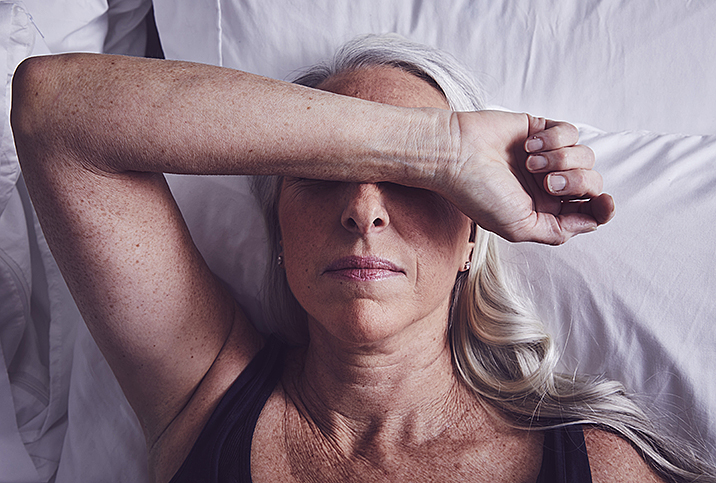What Are Various Symptoms of High Estrogen and Low Estrogen?

Estrogen is the sex hormone most responsible for reproductive development and other essential bodily functions in women. Though it's known as a female hormone, estrogen is produced by men in smaller quantities.
While it's normal for your body's levels of estrogen to fluctuate over a life span and during a menstrual cycle, an imbalance in this female sex hormone can create various symptoms.
But what are the differences in the symptoms of high estrogen and low estrogen?
What are the symptoms of high estrogen levels?
"Too much or too little of something is never a good thing," explained Thais Aliabadi, M.D., a board-certified OB-GYN at Cedars-Sinai in Los Angeles and the founder of Trimly, a supervised weight-loss treatment. "When estrogen levels are too high, hormonal imbalances in your body can occur. An elevated estrogen level can cause you to have a variety of different symptoms."
Aliabadi listed the following common symptoms associated with high amounts of estrogen:
- Irregular menses
- Breast swelling
- Breast tenderness
- Mood problems
- Decreased sex drive
- Weight gain
- Hair loss
- Fatigue or insomnia
Too much estrogen in the body can also cause many reproductive health conditions, such as painful periods, polyps, polycystic ovary syndrome (PCOS), dense breast tissue, fibroids and increased endometriosis pain.
Sometimes excess estrogen does not cause a disease like endometriosis or breast cancer but may worsen the condition.
What are the potential causes for high estrogen in the body?
A number of factors can influence excess estrogen levels. Medications such as steroids and oral contraceptives can create estrogen dominance. Lifestyle factors such as weight gain can also increase estrogen in the body.
For people who have PCOS, estrogen dominance is a pattern.
"In my practice, PCOS remains a big issue for women of childbearing age," Aliabadi said. "With PCOS, women produce a higher level of androgens, a male hormone, which disrupts estrogen levels, leading to irregular periods, weight gain issues, hair thinning, acne and infertility down the road."
What are the symptoms of low estrogen?
As with excess estrogen, lower levels of estrogen can produce adverse symptoms. Aliabadi listed the following as symptoms associated with low hormone levels:
- Hot flashes
- Night sweats
- Irregular menses
- Vaginal dryness
- Dry skin
- Fatigue or insomnia
What are the potential causes for low estrogen in the body?
There's a reason the symptoms related to lowered levels of this reproductive hormone sound just like the symptoms of menopause, or when a woman no longer has her menstrual period. "Menopause is the leading cause of decreased estrogen levels in women," Aliabadi explained.
During menopause, the ovaries stop producing estradiol (E2), the most potent type of estrogen. Once a woman's menstrual cycle ends, her body then makes estrone (E1), according to Cleveland Clinic. The rapid hormonal changes of menopause also put women at a higher risk of mental health issues, such as depression.
While menopause, and the estrogen production change and hormone shift that goes with it, is a leading cause of low estrogen, other factors can cause decreased production of the sex hormone.
"There are many medical conditions that can contribute to women having low estrogen levels," Aliabadi said. "Eating disorders, such as anorexia and bulimia, may cause low estrogen levels."
Eating disorders are often associated with the absence of periods, otherwise known as amenorrhea, which is related to lower estrogen levels.
"Genetic conditions such as Turner syndrome can cause low estrogen levels," Aliabadi added.
Autoimmune conditions and cancer treatments, such as chemotherapy and radiation therapy, can also be a culprit in terms of creating lower estrogen levels.
Essentially, any medical treatment that can affect the ovaries, including removing them, can equate to lower estrogen levels because the sex hormone is predominantly produced in the ovaries.
What are the risks of an estrogen imbalance?
Estrogen is crucial for sexual function, but it's also essential to metabolism and in other areas of the body, such as the cardiovascular and skeletal systems. The right amount of estrogen ensures that the hormone can execute its many jobs. Too little or too much can be a risk factor for various health conditions, like osteoporosis.
The female sex hormone is critical in fertility, too. It helps sustain a pregnancy. Lower estrogen levels may lead to a miscarriage.
"Hormonal imbalances can lead to a variety of different symptoms, however, infertility is the most common consequence women face with hormonal imbalances," Aliabadi explained.
Out-of-balance estrogen levels also cause issues with menstruation and symptoms of menopause.
"Hormonal imbalances can lead to irregular periods in teenagers and young adults," Aliabadi said.
Lack of menstruation, irregular periods, or heavy and painful periods can all be due to an estrogen imbalance, and consistently irregular periods can lead to later health conditions.
Estrogen imbalance can sometimes cause the early onset of menopause.
Some cancers, such as ovarian, uterine and breast cancer, are estrogen-dependent, meaning estrogen can fuel their growth. Estrogen imbalances can also affect mood.
How to detect an estrogen imbalance
To treat a hormone imbalance, detecting it and determining its potential underlying causes are essential.
"A good clinician can detect and diagnose hormonal imbalances from a detailed history, symptoms and clinical examination. I often check hormone blood tests as well to support my diagnosis," Aliabadi explained.
Having a few symptoms of high or low estrogen could warrant a doctor's visit. However, people experiencing excessive weight gain, acne, excessive facial hair or thinning hair should also see their gynecologist for the potential of PCOS, according to Aliabadi.
How to create balanced estrogen levels
Lifestyle changes can help support healthy hormone balance, depending on whether there is too little or too much estrogen production.
"Estrogen imbalances can be treated with lifestyle modifications and the right medications, depending on your age and lifestyle goals," Aliabadi explained. "For example, women facing menopause may choose hormone replacement therapy to combat symptoms of low estrogen. Younger patients that are dealing with PCOS are usually given oral contraceptives to help with the hormonal imbalance that comes with the syndrome."
Hormone replacement therapy (HRT) is a common treatment for people with low estrogen levels. For high estrogen levels, a provider might look into the medications someone is taking, as they might be the culprit. Medications called aromatase inhibitors are used to stop the ovaries from producing estrogen, stop fat cells from releasing estrogen and decrease breast cancer risk.
Lifestyle factors such as stress, alcohol, smoking and poor diet can contribute to unbalanced hormone levels. Making changes in those areas can help promote healthy hormones.
"At the right amount, estrogen is beneficial to your body. Estrogen helps keep your brain, skin, bones and immune system strong and healthy," Aliabadi said.
If you're having symptoms of high estrogen or low estrogen and want to get it checked out but don't have a regular doctor, taking that first step can be difficult. Telehealth can make things easier—both booking the appointment and seeing the doctor. Video visits are a viable option for most people, and more physicians have added them as a service. Giddy telehealth is an easy way to get connected to a qualified healthcare professional who can help with a variety of conditions, often on the same day and at affordable rates.


















